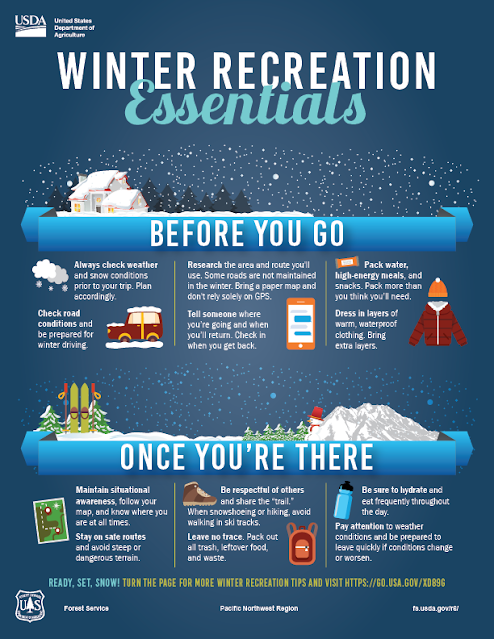A non-profit, volunteer organization dedicated to protecting trail users and forest resources through service and backcountry safety education
Monday, November 28, 2022
Wednesday, November 2, 2022
Hypothermia (From US Forest Service website)
Hypothermia
 When exposed to cold temperatures, your body begins to lose heat faster than it can produce. Prolonged exposure to cold will eventually use up your body’s stored energy, resulting in hypothermia, or abnormally low body temperature.
When exposed to cold temperatures, your body begins to lose heat faster than it can produce. Prolonged exposure to cold will eventually use up your body’s stored energy, resulting in hypothermia, or abnormally low body temperature.
Body temperature that is too low affects the brain, making the victim unable to think clearly or move well. This makes hypothermia particularly dangerous since a person may not know it is happening and won’t be able to do anything about it.
Hypothermia is most likely at very cold temperatures, but it can occur even at cool temperatures above 40 degrees Fahrenheit if a person becomes chilled from rain, sweat, or submersion in cold water.
Victims of hypothermia are most often:
- Elderly people with inadequate food, clothing, or heating
- Babies sleeping in cold bedrooms
- People who remain outdoors for long periods — the homeless, hikers, hunters, etc.
- People who drink alcohol or use illicit drugs.
How do you prevent hypothermia?
- Before you spend time outside in the cold, do not drink alcohol or smoke.
- Drink plenty of fluids and get adequate food and rest. Water helps turn calories into heat and food high in carbohydrates helps keep you powered.
- Wear proper clothing in cold temperatures to protect your body. These include:
- Mittens, not gloves.
- One word: Layers. The outermost clothing layer should be wind-proof and water-resistant; inner layers should be wool or synthetics that are warm when wet. As you get hot and sweat, you can shed a layer or two and still feel comfortable.
- Two pairs of socks. Wool socks will keep your feet warm even if your boots are wet.
- Waterproof hiking boots.
- Scarf and hat that cover the ears to help you avoid major heat loss through the top of your head
What should you avoid?
- Extremely cold temperatures, especially with high winds. Find shelter.
- Wet clothes.
- Poor circulation, which is more likely from age, tight clothing or boots, cramped positions, fatigue, certain medications, smoking, and alcohol.
- If you have diabetes or circulatory problems, see your doctor regularly and maintain good health habits in order to reduce the risk of blood vessel complications that may put you at risk for hypothermia.
What are the symptoms?
- Drowsiness
- Weakness and loss of coordination
- Pale and cold skin
- Confusion
- Uncontrollable shivering, although at extremely low body temperatures, shivering may stop
- Slowed breathing or heart rate
What should you do?
Take the person’s temperature. If it is below 95 degrees the situation is an emergency, so get medical attention immediately. If medical care is not available, begin warming the person, as follows:
- Move to a warm room or shelter.
- Remove any wet clothing from the victim.
- Warm the center of the body first — chest, neck, head, and groin — using an electric blanket, if available, or warm compresses. Use skin-to-skin contact under loose, dry layers of blankets, clothing, towels, or sheets.
- Provide the victim with non-alcoholic warm beverages – but no alcohol – to help increase body temperature. Do not try to give beverages to an unconscious person.
- Keep the person dry and wrapped – including the head and neck – in a warm blanket even if the body temperature has increased.
- Stay with the person until medical help arrives.
Do not do the following:
- Do not assume that someone found lying motionless in the cold is already dead.
- Do not use direct heat (such as hot water, a heating pad, or a heat lamp) to warm the person.
- Do not give the person alcohol.
How serious can it get?
A person with severe hypothermia may be unconscious and may not seem to have a pulse or to be breathing. CPR should be administered in that case and continue until while the victim is being warmed, until the victim responds or medical aid becomes available. In some cases, hypothermia victims who appear to be dead can be successfully resuscitated.
Source: Forest Service research; National Institutes of Health
-
As I have recounted here on previous occasions, the Backcountry Trail Patrol Association was formed in 1999 as a program of the old North-Ce...
-
National Police Week This week, National Police Week, is dedicated to honoring the brave men and women who selflessly serve and protect th...





